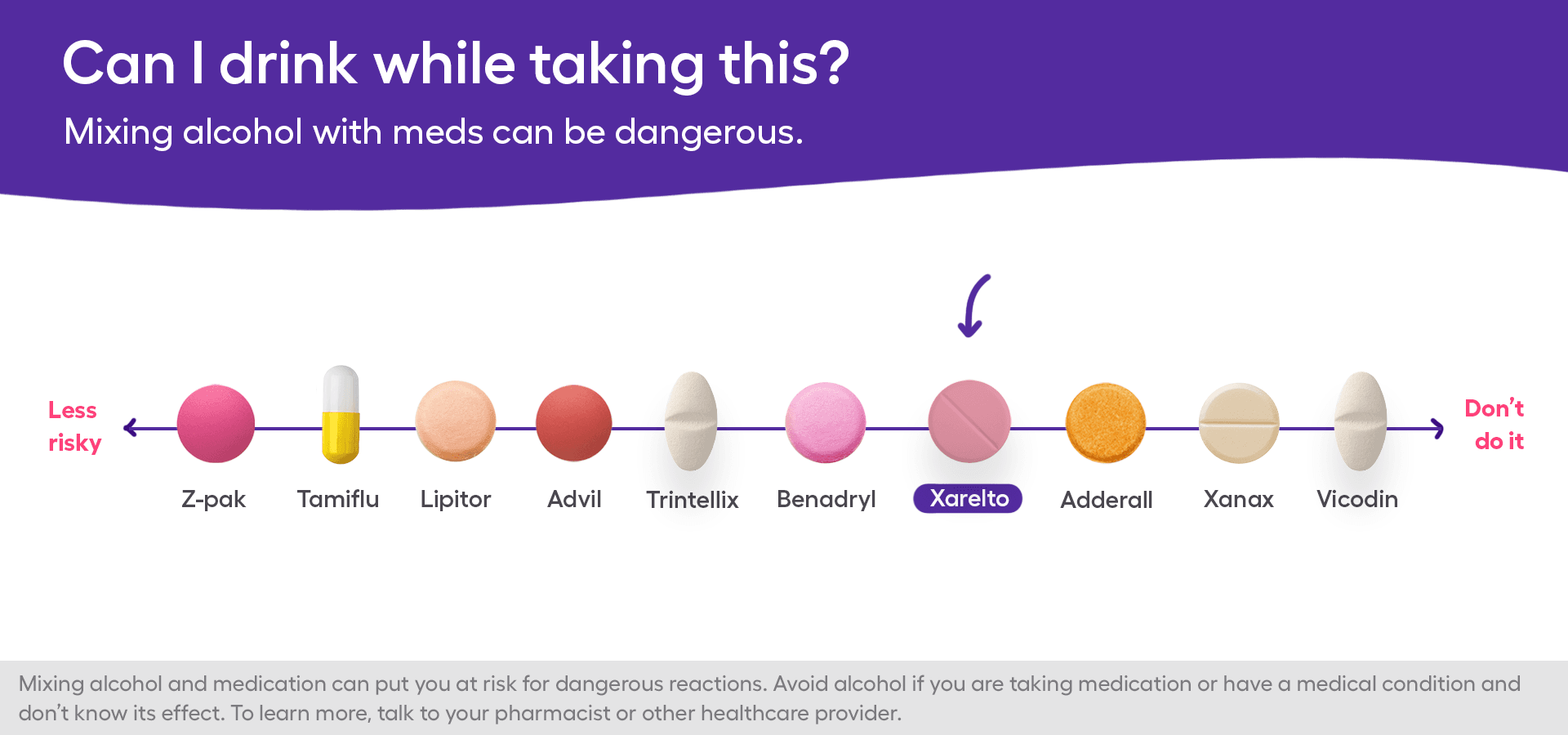Key takeaways
Mixing Xarelto, a prescription blood thinner, with alcohol can potentially cause bleeding problems, though moderate drinking may be permissible with a doctor’s consultation.
Both Xarelto and alcohol thin the blood by affecting proteins involved in the blood-clotting process, which can dangerously enhance each other’s effects.
Excessive and/or chronic alcohol consumption while taking Xarelto can lead to severe bleeding problems, and may exacerbate insomnia, anxiety, and depression, in addition to causing liver damage.
While it’s generally advised to avoid alcohol while on blood thinners like Xarelto, light to moderate drinking might be allowed under a doctor’s guidance, so be sure to seek professional medical advice.
If you’re tempted to have a few drinks at your next social event, whether it’s a birthday party, wedding, or a regular night out with friends, you might want to reconsider drinking alcohol if you’re also taking Xarelto. Xarelto is a prescription blood thinner used to treat and prevent blood clots. You might be prescribed Xarelto to prevent a blood clot in a deep vein, otherwise known as deep vein thrombosis or DVT. If left untreated, deep vein thrombosis can lead to a piece of the blood clot breaking off and blocking blood flow in the lungs (also called a pulmonary embolism or PE).
Alcohol is a substance that can also affect the blood-clotting process. When taken together, alcohol and Xarelto can potentially cause bleeding problems. While drinking alcohol in moderation is unlikely to cause significant harm with Xarelto, you should talk to your doctor about your specific bleeding risks.
Continue reading to learn more about what happens when you mix Xarelto and alcohol.
RELATED: What is Xarelto?
Can you take Xarelto with alcohol?
To understand whether you can take Xarelto together with alcohol, it’s important to understand how the drug works. Xarelto, also known by its generic name rivaroxaban, is a factor Xa inhibitor. It treats blood clots by blocking factor Xa, a vital protein involved with the formation of blood clots.
Alcohol, or ethanol, is a substance that is found in beer, wine, and liquor. Clinical studies have shown that alcohol can also thin the blood by reducing levels of fibrinogen, another protein involved with blood clotting. One study found that high levels of alcohol consumption, or around two to three drinks per day, reduced fibrinogen levels by 14%.
The FDA label of Xarelto does not explicitly mention any drug interactions between Xarelto and alcohol. However, both Xarelto and alcohol act as blood thinners, and it can be dangerous to combine a drug and a substance that have similar effects. The side effects of Xarelto and alcohol include bleeding problems, which can cause symptoms like:
- Unusual bruising
- A tendency to bruise more easily
- Bleeding gums
- Bleeding that lasts longer than usual after a cut
- Nosebleeds that occur frequently
Symptoms of severe bleeding problems from Xarelto and alcohol include:
- Coughing up blood, which may look like coffee grinds
- Blood in the stool or urine
- Menstrual bleeding that is heavier than normal
- Severe bruising that spreads to other areas
- Headache
Other side effects of Xarelto and alcohol
Xarelto may cause other side effects, such as dizziness, fatigue, and stomach pain. If you drink alcohol while on Xarelto, these side effects can be worsened. In rare cases, Xarelto has also been reported to cause insomnia, anxiety, and depression. Alcohol use has been linked to cases of insomnia, which may worsen potential side effects of insomnia with Xarelto.
Chronic alcohol use can increase the risk of alcohol use disorder, which is associated with anxiety and depressive disorders. People who are taking Xarelto and prone to experiencing anxiety or depression may want to avoid drinking too much alcohol.
Both alcohol and Xarelto are processed in the liver, which can have harmful effects on the body in some cases. The liver is heavily involved with the blood clotting process, producing most of the proteins needed for clots. Excessive alcohol consumption can damage the liver over time and lead to problems with blood clotting. Add to that the potential effects of Xarelto on the liver and this combination may cause an increased risk of liver problems and bleeding.
Frequently asked questions regarding Xarelto and alcohol
How much alcohol can you safely drink while taking Xarelto?
It should be fine to occasionally consume alcohol in moderation while taking Xarelto. In most cases, you could occasionally consume one drink if you’re a woman or two drinks if you’re a man within a 24-hour period. However, you should avoid drinking more than these limits and for more than a couple of days in a row. Otherwise, you could be heading into heavy alcohol use territory, which can increase the risk of severe bleeding problems with Xarelto.
Can you drink alcohol while taking blood thinners?
It’s not generally recommended to drink alcohol while taking blood thinners like Xarelto. Other drugs that act as blood thinners include warfarin and aspirin. Mixing alcohol with blood thinners can increase the risk of bleeding and should be avoided in most cases. You may be safe to drink alcohol on occasion while on blood thinners and if your doctor gives you the go-ahead.
Does alcohol make blood clots or risk of stroke worse?
Light-to-moderate consumption of alcohol has been shown to decrease the risk of coronary heart disease (CHD). Middle-aged people who drink in moderation may have a 20% to 30% lower chance of developing CHD than those who don’t drink. Because alcohol acts as a blood thinner, it might actually help protect against blood clots and stroke when consumed in moderation. On the other hand, excessive consumption of alcohol has been linked to higher rates of CHD and stroke.
Is Xarelto hard on the liver?
Xarelto is primarily processed in the liver. For this reason, Xarelto is not recommended to be used in those who have severe liver disease, including liver problems linked to blood-clotting problems (coagulopathy). Taking Xarelto can increase the risk of bleeding if you also have severe liver disease. Rarely, Xarelto can directly cause damage to the liver.
Looking out for your health
The next time you think about drinking alcohol while taking Xarelto, make sure you’re aware of the potential consequences and side effects. If you have any questions about mixing alcohol and Xarelto, you should also consult your healthcare provider or pharmacist.





